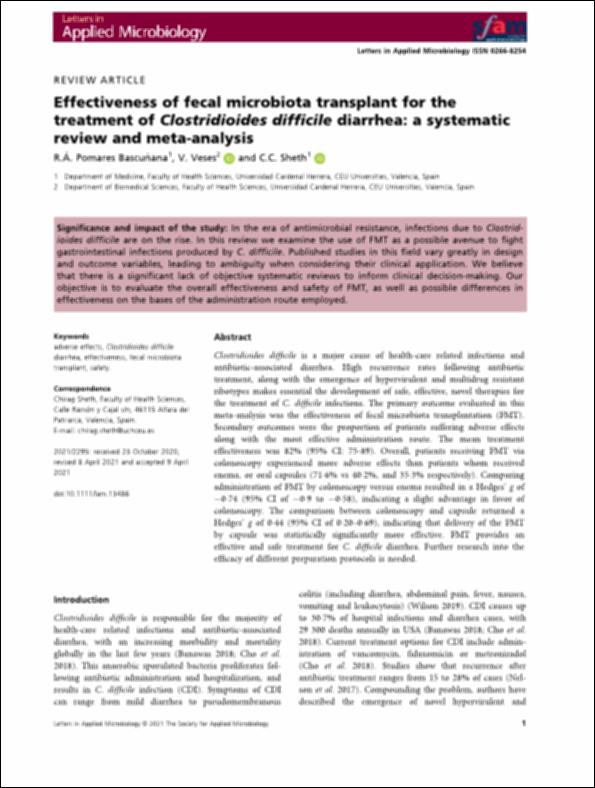Please use this identifier to cite or link to this item:
http://hdl.handle.net/10637/13926Effectiveness of fecal microbiota transplant for the treatment of "Clostridioides difficile" diarrhea : a systematic review and meta-analysis
| Title: | Effectiveness of fecal microbiota transplant for the treatment of "Clostridioides difficile" diarrhea : a systematic review and meta-analysis |
| Authors : | Pomares Bascuñana, R. Á. Veses Jiménez, Verónica. Sheth Shah, Chirag Chandrakant |
| Keywords: | Diarrhea - Treatment.; Pathogenic microorganisms.; Microorganismos patógenos.; Diarrea - Tratamiento.; Intestines - Diseases - Treatment.; Intestinos - Enfermedades - Tratamiento. |
| Publisher: | John Wiley & Sons Society for Applied Microbiology |
| Citation: | Pomares Bascuñana, R. Á., Veses, V. & Sheth, C. C. (2021). Effectiveness of fecal microbiota transplant for the treatment of "Clostridioides difficile" diarrhea: a systematic review and meta-analysis. Letters in Applied Microbiology, vol. 73, i. 2 (aug.), pp. 149–158. DOI: https://doi.org/10.1111/lam.13486 |
| Abstract: | Clostridioides difficile is a major cause of health-care related infections and antibiotic-associated diarrhea. High recurrence rates following antibiotic treatment, along with the emergence of hypervirulent and multidrug resistant ribotypes makes essential the development of safe, effective, novel therapies for the treatment of C. difficile infections. The primary outcome evaluated in this meta-analysis was the effectiveness of fecal microbiota transplantation (FMT). Secondary outcomes were the proportion of patients suffering adverse effects along with the most effective administration route. The mean treatment effectiveness was 82% (95% CI: 75-89). Overall, patients receiving FMT via colonoscopy experienced more adverse effects than patients whom received enema, or oral capsules (71'6% vs 40'2%, and 35'3% respectively). Comparing administration of FMT by colonoscopy versus enema resulted in a Hedges’ g of 0'74 (95% CI of 0'9 to 0'58), indicating a slight advantage in favor of colonoscopy. The comparison between colonoscopy and capsule returned a Hedges’ g of 0'44 (95% CI of 0'20–0'69), indicating that delivery of the FMT by capsule was statistically significantly more effective. FMT provides an effective and safe treatment for C. difficile diarrhea. Further research into the efficacy of different preparation protocols is needed. |
| Description: | Este artículo se encuentra disponible en la siguiente URL: https://sfamjournals.onlinelibrary.wiley.com/doi/epdf/10.1111/lam.13486 Este es el postprint del siguiente artículo: Pomares Bascuñana, R. Á., Veses, V. & Sheth, C. C. (2021). Effectiveness of fecal microbiota transplant for the treatment of "Clostridioides difficile" diarrhea: a systematic review and meta-analysis. Letters in Applied Microbiology, vol. 73, i. 2 (aug.), pp. 149?158, que se ha publicado de forma definitiva en https://doi.org/10.1111/lam.13486 This is the peer reviewed version of the following article: Pomares Bascuñana, R. Á., Veses, V. & Sheth, C. C. (2021). Effectiveness of fecal microbiota transplant for the treatment of "Clostridioides difficile" diarrhea: a systematic review and meta-analysis. Letters in Applied Microbiology, vol. 73, i. 2 (aug.), pp. 149?158, which has been published in final form at https://doi.org/10.1111/lam.13486 |
| URI: | http://hdl.handle.net/10637/13926 |
| Rights : | http://creativecommons.org/licenses/by-nc-nd/4.0/deed.es |
| ISSN: | 0266-8254 1472-765X (Electrónico) |
| Issue Date: | 28-Aug-2021 |
| Center : | Universidad Cardenal Herrera-CEU |
| Appears in Collections: | Dpto. Medicina y Cirugía |
Items in DSpace are protected by copyright, with all rights reserved, unless otherwise indicated.


